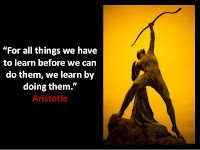 |
| Pettis‘ manifesto demands the freedom needed to make things work. Educators might get excited about Maker philosophy like this, but it isn’t what they want in classrooms. |
This talk of Making at ECOO had me thinking about my own process of building, repairing and creating.
My engineering process is closely related to my creative process. Creativity came first as a toddler mainly because I found visual art intuitive to step into. Engineering followed shortly thereafter (about 6 years old?) when I found myself dismantling bicycles and toys, sometimes for creative purposes but mainly driven an intense desire to understand how things work. My mother was an artist, my father is an engineer; my behavior wasn’t a happy accident.
Both my processes have evolved and entwined, and both demand absolute ownership. I find myself fully committed to my process which makes the idea of going to committee abhorrent. If what I’m doing ends up not working it’s on me and me alone. That focus and responsibility is what allows me to work through frustrating, stochastic, non-linear builds and repairs that would cause most people to shrug and give up.
I prefer to work alone. If I’m going to seek help, I will initiate it. Being forced to accommodate collaboration prevents me from doing what needs to be done to make the thing work. Lateral thinking never works well when you’ve have to constantly explain every intuition, it breaks your flow.
How much faith do I have in my process? I drove my wife and newborn son home in a car I rebuilt the brakes on. I ride a motorcycle (with my son on the back) that I rebuilt from scrap. If I did it, it’s done properly, I regularly bet my life on it. This is what competency looks like when making something work is the priority; mechanical mastery can’t exist in any other circumstance.
 |
| intuition works best in silence |
 When I’m working on an engineering problem or a creative project I am radically engaged (fixated?) with what I am doing. This isn’t the kind of directed, controlled engagement that teachers encourage in classrooms. Being interrupted by a well-meaning teacher who wants to make my process transparent antagonizes the hell out of me.
When I’m working on an engineering problem or a creative project I am radically engaged (fixated?) with what I am doing. This isn’t the kind of directed, controlled engagement that teachers encourage in classrooms. Being interrupted by a well-meaning teacher who wants to make my process transparent antagonizes the hell out of me.
Teacher interruptions in my process are vexing. I don’t seek an expert to do it for me, that doesn’t teach me anything. I’d prefer to ask another capable student who is struggling with similar issues and figure it out with them rather than ask a teacher who has done it a hundred times before. This is what mastery learning is and why it seldom happens in a classroom.
This all comes from my first post-secondary learning experience as a millwright apprentice. I left high school before graduation because it felt like a holding tank rather than a learning opportunity. In that apprenticeship I didn’t have teachers assessing my learning, I had people who were invested in it because it meant less work for them. That we were all doing the same work went a long way toward me valuing their expertise.
Collaboration isn’t the point of any engineering activity. It shouldn’t remove the focus from a project, it should amplify it. When teachers say things like, “we’re going to be makers, but what the kids are really learning is collaboration!” I would expect to see a group of frustrated students and a pile of newly purchased Arduinos and Raspberry Pis gathering dust in boxes. You’ve got to respect the skill and focus needed to make things work first.
My favorite kind of teacher is the one I try to be. I encourage skills development and provide expertise if asked (though I am reluctant). I provide materials and offer multiple avenues into how to get it done, but then I get the hell out of the way. What I hope to see is a student lose themselves in their process and improve as a result of this intensive engagement. You learn more in the doing of a thing than you ever do in the theory of it.
I observe, I offer help if it’s asked for, but I also allow students to fail if they refuse to take risks and engage in a meaningful engineering process. In the best cases I’m able to look at a finished prototype that shows resiliency, creativity, and works. That last bit is important, I’m not grading how hard they tried, or how well they get along with each other, I’m grading engineering. The student who built a working prototype feels a genuine sense of achievement because they went through real struggle to resolve complex, non-linear (non-textbook) problems. They seldom worry about what kind of mark they got, the value is self-evident.
 |
| Assumptions and cultural influences won’t get you far in mechanics – you need to be stringent and respect reality because it doesn’t care about your perceptions. This is the reason why two mechanics from opposites sides of the world with no shared language can still effectively communicate with each other. Reality is a shared language. |
A highlight of a recent unit was watching a student who found the process of building Arduino circuits very challenging. In his presentation of a partially working prototype he angrily said, “… and it didn’t work again, until I realized, like a n00b, that I hadn’t plugged the power wire into the rail.” He was absolutely right, he is no longer n00b, and he should be frustrated with having made such a rudimentary mistake. His emotional engagement with his failure was telling – he is beginning to take pride in his skills.
Emotional engagement is at the root of my work with machines. Radical engagement makes my process an emotional one (or is it the other way around?). The sometimes stochastic, often non-linear and usually frustrating nature of building and repairing complex machinery requires an emotional edge. That edge is what powers my resiliency. I refuse to let a complication derail me, sometimes not giving up even when I should. If it continues to not work, emotion not only powers my resiliency but also my imagination, driving me to think laterally around problems.
Class bells, rubrics, teachers showing you how and assigned groups are the antithesis of my kind of radical engagement. Schools seem designed to prevent this kind of focus and break learning up into an arm’s length, carefully managed chunks. Learning is an organic process until you see it diced up into curriculum and fed to students who have no idea what it is they are supposed to be learning or why. The education system might work for basic skills but mastery isn’t what its set to produce. Education elbows its way between student curiosity and their natural tendency to learn in order to manage the process. The ultimate purpose of the education system is not to teach but to produce grades which everyone believes are an expression of student learning but are actually entirely fictional.
Radical emotional engagement is the antithesis of the clinical, rational engagement educators look to manage, but this emotional engagement is at the root of my empathy with machines, Education spends a lot of energy encouraging collaboration, linear consumption of curriculum and a cold kind of empathy between students, but ignores (stamps out?) human emotional engagement in order to retain control.
The difference between how I and many others learn, and the mono-cultural, rationalist’s philosophy of education is why you seldom see radical engagement in a classroom. It’s why you see outliers, especially highly engaged ones, do poorly in school. Education is designed to hit the medium, the comfortable middle class child who requires no emotional connection because they have it elsewhere. Deviants, whether they are eccentrics who want radical engagement in something they are fixated on, or students who need more from a teacher than grades, aren’t a good fit with the system.
 |
The difference between applied and academic students has
a lot more to do with family dynamics and the need for
emotional engagement than it does with intelligence. |
Education’s discomfort with emotional engagement lies at the root of Ontario’s high school streaming system. Applied students tend to come to school from less stable home lives and look for more emotional engagement with their teachers. This freaks out the academics who teach them. Academic students (and the teachers they turn into) prefer to treat school at arm’s reach – rationally and emotionally distancing themselves from it because information is all they require from a classroom. To these academics school is a job, one they have figured out and are good at. These are the students who get mad at you when you saddle them with a problem that may not have a solution.
This distance between student need and teacher approach is probably the single largest difference between academic and applied students. Some of the smartest kids I’ve ever taught have been applied level students. Teachers willing to support emotional engagement with learning often find these students are the ones who make the biggest leaps in high school, but they are challenging and often emotionally exhausting, especially when the rationalists who run the system think 30+ students in a classroom is manageable (and it is if you don’t treat students like people).

 Ironically, all of those teacher movies that educators so love are the ones that emphasize this emotional learning connection but it just doesn’t happen that often in the real world. At a recent Heads’ meeting a rule was put up saying that people have to be rational and unemotional when making suggestions. They can’t be emotionally engaged in any debate. That’s how ed-quants like it in the classroom too. What a sure way to make something tedious, distant and uninspired.
Ironically, all of those teacher movies that educators so love are the ones that emphasize this emotional learning connection but it just doesn’t happen that often in the real world. At a recent Heads’ meeting a rule was put up saying that people have to be rational and unemotional when making suggestions. They can’t be emotionally engaged in any debate. That’s how ed-quants like it in the classroom too. What a sure way to make something tedious, distant and uninspired.
Radical engagement is powered by emotion. It makes for a messy, demanding learning environment, but it’s also a vital key to differentiating learning that the vast majority of educators don’t just ignore but actively seek to stamp out. The doorway to mastery is one you have to walk through yourself, and you’ll never manage it if you’re dependent on the advice of others. It takes resiliency, courage and a lot of work to become that kind of proficient. Emotion is a powerful ally in getting there.

 I’ve never been on a provincial team before, it’s quite the experience. In addition to the unnatural process of leaving school, getting on an aeroplane and flying away from the classroom in early June, it also puts you together with all the other gold medalists, some of whom you lost against in other categories, except now you’re team mates.
I’ve never been on a provincial team before, it’s quite the experience. In addition to the unnatural process of leaving school, getting on an aeroplane and flying away from the classroom in early June, it also puts you together with all the other gold medalists, some of whom you lost against in other categories, except now you’re team mates. 
































